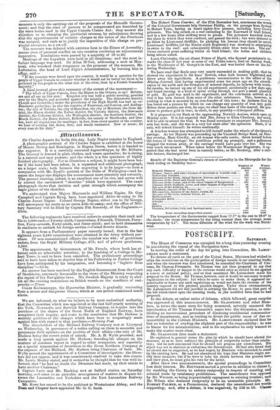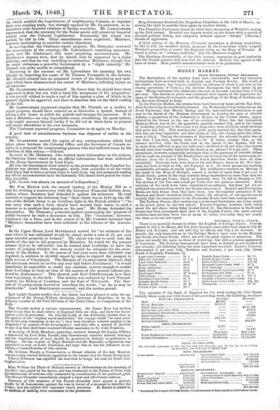POSTSCRIPT.
SATURDAY.
In moving the order of the day for going into Committee, Mr. LAB011- CHERE made a statement.
To obviate all cavil on the part of the United States, Ministers had wished to relax the restrictions on the participation of foreign vessels in our coasting trade; and when the measure was first introduced, he consulted the Chairman of Cus- toms, Sir Thomas Fremantle. Sir Thomas was not then prepared to say that any such difficulty or danger to the revenue would arise as should be set against a course of national policy; and on that assurance Mr. Labouchere made his proposal to the House. Sir Thomas, however, said it would be necessary to make regulations on the subject: but when he came to make them, it appeared im- practicable to frame any such regulations as would not leave the revenue of the country exposed to the greatest possible danger. Under these circumstances, Mr. Labouchere did not feel justified in advising the House to pass that part of the bill which threw open the coasting trade, in ,the modified form that he had proposed.
In the debate, or rather series of debates, which followed, great surprise was expressed at this announcement. Mr. GLADSTONE and other Mem- bers, in terms the more stern for being measured, severely censured the introduction of Sir Thomas Fremantle's name into the discussion, as esta- blishing an inconvenient precedent of disclosing confidential communica- tions of departments, and as tending to divert the public sense of due re- sponsibility in the Cabinet Ministers. Mr. LABOUCIIERE declared that he had no intention of evading the slightest part of the responsibility: he was to blame for the miscalculation; and in his explanation he only wanted to make the matter more clear.
Mr. GLADSTONE then made a statement.
He explained in general terms the plan by which he should have altered the measure, so as to have enforced the principle of reciprocity rather than retalia- tion ; bat he now announced that he should not propose any amendment. His object was not to obstruct or embarrass the Government. He had also found that be should not be supported, as he had hoped, by Members who intended to stand by the existing laws. He had not abandoned his hope that Ministers might mo- dify their measure; but if be were to take his choice between the present laws and their plan, he must give his vote for the latter.
After these two announcements, the special proceedings in Committee lose their interest. Mr. BM:WEIDE moved a proviso in addition to clause I, for enabling the Crown to enforce reciprocity in respect of coasting and colonial trade by retaliatory prohibitions. The amendment was opposed by Mr. WILSON, as being impracticably oppngnant to existing treaties; and Mr. Wilson also declared reciprocity to be an untenable principle. Mr. ROBERT PALMER, as a Protectionist, declared the amendment not worth supporting; and, after a debate, it was negatived, by 132 to 15. Clause 14, which enabled the Legislatures of neighbouring Colonies to regulate their own coasting trade, was strongly opposed by Mr. GLADSTONE, as in- mums' tent with Imperial relations to foreign countries. Mr. LABOUCHERE represented, that the necessity for the Royal assent still preserved Imperial control over the Colonial Legislatures. Eventually, the clause was carried, by 158 to 104. Other amendments were negatived; Ministers, however, undertaking to consider certain objections.
In moving that the Chairman report progress, Mr. DiseAELI reviewed the occurrences of the evening—Mr. Labouchere's surprising announce- ment, and Mr. Gladstone's still more surprising announcement. Mr. Gladstone's reasons were, that he should only be supported by a slight minority, and that he was unwilling to embarrass Ministers; though how he could embarrass a powerful Government by a " slight minority," Mr. Disraeli was quite unable to comprehend.
Recurring to the censure on Mr. Labouchere for excusing his own blunder by importing the name of Sir Thomas Fremantle in the debates, Mr. Disraeli entered into an animated review of the blundering and rash- ness which have characterized the career of Ministers, inflicting injury on all interests.
Mr. GLADSTONE defended himself He knew that he should have been supported at first, but not with a bona fide acceptance of his proposition: it was merely wished to made a tool of him against a plan of which in its general objects he approved, and then to abandon him on the third reading of the bill.
Mr. LABOUCHERE expressed surprise that Mr. Disraeli, on a motion to report progress, should have entered on so discursive a speech, instead of taking a few hours to polish his periods and arrange his sarcasms. If he were a Minister,—no very improbable event, considering his great talents, —he might account himself lucky if he did not at times have to propose still larger alterations in his own measures.
The Chairman reported progress; Committee to sit again on Monday.
A good deal of miscellaneous business was disposed of earlier in the evening.
Mr. GLADSTONE moved for copies of any correspondence which had taken place between the Colonial Office and the Governor of Canada re- lative to a proposal for compensating persons who had suffered losses by the rebellion in that colony.—Ordered. In reply to Mr. HERRIES, who wanted more information on the subject, Sir GEORGE GREY stated that no official information had been addressed to the Home Government by Lord Elgin.
All that the Government knew relative to the proceedings in the Canadian Le- gtsleture was derived from newspapers, which were accessible to all the world. Lord Elgin had written a private letter to Lord Grey, but had postponed sending any official communication until the Indemnity Bill should have passed the Cana- dian Assembly. [Mr. Hawes was absent, on account of indisposition.]
Mr. Fox MAULE took the second reading of the Mutiny Bill as a text for reviving a controversy with the Liverpool Financial Reform Asso- ciation, whose Secretary had defended it against his strictures. He read extracts to support his inference that " their object was to hold up the offi- cers of the British Army its an invidious light to the British soldiers ": "he was sorry that such a body should have worded their tracts in such a manner as to produce that opinion on his part." Mr. HOME defended the Association. Mr. DISRAELI protested against interrupting the progress of public business by such a discussion as this. The "discussion," however, continued for a time; and in the course of it, Mr. COBDEN declared that " Ministers themselves have been indebted to the labours of the Associa- tion."
In the Upper House, Lord MONTEAGLE moved for " an estimate of the sum which it was calculated would be raised under a rate of 2* per cent upon rateable property in Ireland." His object was not to enter into the merits of the rate in aid proposed by Ministers; he would for the present assume that to be advisable: but he wanted their Lordships to have the means of judging whether the remedy would be adequate for the emer- gency of the disease. In the course of last year more than 160,0001. was required, in addition to 46,0001. raised by rates to support the paupers in eight unions of Connaught. The Marquis of CIANRICARDE objected, that the document would be unlike any ever laid before Parliament: " it would manifestly be impossible to make any estimate correct enough to enable their Lordships to form an idea of the success of the general scheme pro- posed by Government." This showed, said Earl FITZWILLIA3I, how they were legislating in the dark. The motion was enforced by Lord WeREN- MUTE, the Bishop of CASHELL, and the Earl of Wicktow. The Mar- quis of CLANRICARDE desired to introduce the words, " as far as may be practicable." Lord MONTEAGLE assented; and the motion passed.



























 Previous page
Previous page